- Home
- Sharyn McCrumb
Missing Susan Page 13
Missing Susan Read online
Page 13
“Top floor,” she said aloud. “Old servants’ quarters. This is where the first Mrs. Rochester would have lived, I presume.” The fact that her room was well-kept and tidy, with a private bath and a television, did little to dispel her feelings of gloom after the long trek up the endless flight of stairs. From her casement window she could see the south lawn and the moors beyond, but the narrow walkway outside the window made her think of cat burglars and itinerant vampires. “At least it’s only for one night,” she reminded herself.
Hurriedly she changed into slacks and sensible walking shoes, glad for an excuse to leave her solitary quarters. Even a walk without shopping was better than being the madwoman in the attic.
When she arrived on the south terrace, she found the rest of the group already assembled and posing for pictures on the stone balustrade overlooking the flower beds. Susan Cohen and Charles Warren took turns playing photographer with their respective cameras. Rowan Rover had put on his tan windbreaker in anticipation of windy weather on the moors. He gravely inspected the rest of the party to see that no one proposed to mountain climb in high-heeled shoes or sundresses. Satisfied that the troops were at least impersonating competent hikers, be began the march down the wide stone steps and across the grass. There is a path through the woods at the bottom of this hill,” Rowan told them. “It eventually ends up in North Bovey, but I thought that you might prefer a nice bracing walk on the moors.”
He had studied Barts Drivers Road Atlas to Britain and discovered to his annoyance that the Great Grimpen Bog was not among the topographical landmarks featured in that August volume. Still, his annotated Sherlock Holmes had mentioned it, coyly noting that Conan Doyle had merely changed the name Great Grimpen Bog to Great Grimpen Mire in order to avoid the use of the schoolboy’s word for toilet. My plan will be in the bog without any paper if there isn’t any mud, Rowan thought, reverting to the juvenile use of the word. He had wanted to ask the hotel people about rainfall in recent months, but someone might remember the question later, so he decided not to risk it. The editors of The Annotated Holmes had put the Grimpen Mire west of Moretonhampstead, about three miles north of the village of Widecombe in the Moor, fabled in the folksong for its fair. And I’m going to get them stuck, thought Rowan sardonically. Uncle Tom Cobleigh and all.
As he marched the group past brilliantly sunlit flower beds and the lush greenery of the golf course, he found himself wishing for more suitable moorland weather. It should be a windy autumn night, with a sliver of pale moon occasionally visible through shrouds of rolling fog. Their steps across the steep fold of hills should have been punctuated by the baying of a gigantic hound. Instead he had to cany out his dark deed against a backdrop of green hills and blazing blue sky that suggested the opening scenes of The Sound of Music.
At the bottom of the sloping lawn was a wide walkway that encircled the manor. Leading off from it, a narrow trail wound its way into the woods. The group set off on the woodland trace, chattering happily about plans for tea and comparing room descriptions.
“There’s a fallen tree across the path!” Alice MacKenzie announced indignantly.
They were still within sight of the golf course.
“It probably fell during the windstorms last winter and no one’s bothered to clear it yet,” said Rowan. “It shouldn’t trouble us. I’ll climb over and help each of you across.”
With varying degrees of agility, each member of the party clambered over the trunk of the felled oak, assisted by the ever-patient Rowan Rover, who knew that he had to keep them busy and happy for another three miles at least before he could expect to find any dangerous patches of mire. As they trotted along the well-worn path beside a sparkling brook, Rowan pointed out wildflowers and marveled at the wonderfully summeriike weather they were enjoying. Privately, he considered a thermometer reading approaching body temperature an appalling condition for an uphill hike, but he reminded himself that Americans were accustomed to warmer weather.
“Don’t you think it’s a bit hot for a long walk?” panted Elizabeth MacPherson, echoing his thoughts. By this time the path had forked and they had chosen to follow the route that became a steep incline, angling toward the open moors. “I was just worried about Maud on account of her age, you know.”
With great deliberation, Rowan stopped and looked back at the rest of the party. Maud Marsh, a few yards behind them, was striding briskly along at the head of the pack, without even breathing heavily. The others were grouped together, a bit red-faced, and talking less than usual. Far in the rear, Susan Cohen glistened with sweat, her shoulders heaving as she breathed. “What is this?” she yelled out. “The Devonshire Death March?”
Rowan pretended not to have heard. “Walking the moors is one of my hobbies!” he called out encouragingly. “It’s good exercise and it clears the mind wonderfully.”
“Mine is certainly clear,” gasped Elizabeth. “I can think of nothing except the pain in my calf muscles.”
“Perhaps it would help if we put price tags on the fence posts,” snapped Rowan.
They tramped into a narrow dirt lane lined by blackberry thickets. Rowan graciously invited the group to stop for a moment, catch their breath, and sample the wild berries. He walked a few yards on to the top of a slope and scanned the grassy plain for the telltale bright green spots that signified patches of bog. He thought he spotted a few likely candidates to the northwest. Now would be a good time to leave the path and strike out across open country.
“How is everyone?” Rowan asked genially, surveying the party. “Enjoying your walk?”
“Nancy and I enjoy walks,” said Charles Warren, looking as fit as ever. “We do about seven miles a week.”
“Not uphill,” his wife retorted, fanning herself.
“Of course, nurses are used to doing a lot of walking, too. I just wish I’d brought proper running shoes,” said Kate Conway, looking sadly down at her espadrilles.
“Where’s the village?” Susan demanded. She was beginning to sag under the weight of her camera. “I thought you said the village was a mile away. We must be damn close to Scotland by now.”
The guide feigned surprise. “The village is in the other direction,” he informed her. “We veered off from that path shortly after we passed the fallen tree. I thought you wanted to take a walk up here on the moors. The views are breathtaking, aren’t they?”
“All I see is a bunch of pasture without any cows,” Susan grumbled. “You’ve seen one blade of grass, you’ve seen ’em all.”
“Tell you what,” said Rowan to the group. “Let’s get up out of this lane and walk across the moors. I’ll bet you can see for miles from that tor off to the right.” He took a short running start and scrambled up the bank, motioning for the others to follow him.
The Warrens and Kate Conway clambered after him. And one by one the others made their way up the grassy embankment.
“We’ll probably be in the guidebooks next year,” Elizabeth muttered to Emma Smith. “Party of American tourists dies of heat prostration on the Devonshire Death March. There’ll be a statue of Rowan Rover in Madame Tussaud’s Chamber of Horrors.”
Emma Smith giggled. “Well, hiking is good exercise. I’ve felt guilty about not keeping up with my running on this trip.”
Her mother nodded in agreement. “Emma and I also play tennis together twice a week. It certainly helps you keep your wind.”
Rowan Rover grabbed Susan’s hand and hauled her the last few feet up the bank. “Not tired, are you?” he asked. “Youngest member of the party and all.”
“I’ll make it,” she said through clenched teeth.
“Good. It’s wonderful for burning the calories, you know. Why don’t you walk up front with me?” he asked. “I notice you brought your camera. Perhaps you’d like to go on ahead and check for photo opportunities. It’s fairly level up here, as you can see.”
“Oh, all right,” said Susan, pushing sweat-dampened strands of hair away from her forehead. “I just hop
e we’re not going to go too far.”
Rowan gave her a dazzling smile of encouragement. With any luck at all, he thought, you won’t have to walk back.
Susan stalked ahead without any apparent enjoyment of the breathtaking scenery, while Rowan contrived to fall farther and farther behind. It had occurred to him that steering Susan toward the bog was of no use if there were a dozen people close behind, ready to pull her out again. He doubted if he could get them out of earshot, but he thought that it might help to split up the herd. Perhaps he could manage to get someone else stuck in a different patch of mire (preferably Elizabeth MacPherson); and while the others were rescuing her, he could go off and drown Susan.
He approached the stragglers, radiating concern for their welfare. “Is everyone all right here? Miriam? Alice? If anyone would like to go back to the hotel, it’s straight down the hill behind you.”
Miriam looked doubtfully at the long stretch of grassland rolling before them. She was wearing a heavy sweater and her face glistened with perspiration. She looked doubtfully at her daughter. “Do you want to keep going, Emma?”
Taking the cue, Emma said quickly, “No, I think we’ve had enough exercise for one afternoon. We’ll walk tomorrow morning when it’s cool, if you like, Mother. Alice, do you want to come back with us?”
“I suppose so,” said Alice. “I’m not much on hiking if there’s nowhere in particular to go.”
“Go back then,” the guide said soothingly. “We shan’t be long.” Seven to go, he thought, as he watched the three-some wend their way back across the meadow to the blackberry lane. A few moments later he sidled up to Charles and Nancy Warren, who were chatting with Martha Tabram. Feigning a perplexed expression, he said, “According to my guidebook, there is an ancient stone circle somewhere in this area. It is quite a beautiful ring of stones, set against imposing moorland scenery, and I’m sure you’d like to photograph it. Would you like to go off to the left and see if you can catch a glimpse of it. Susan is scouting in the other direction.”
Charles Warren looked at his wife. “That does sound like a good picture, doesn’t it, Nancy? Shall we go and look for it?”
Martha Tabram hesitated. “I seem to remember hearing somewhere that these moors could be dangerous. Are you sure it’s wise for us to separate?”
“Dangerous? Rubbish! Conan Doyle didn’t know what he was talking about. Hound of the Baskervilles notwithstanding, I assure you that not a single moor pony has ever been lost in the bogs here.” A Land Rover and a couple of Danish hikers, yes, but not a pony, he finished silently. “Off you go, then. If you find the stone circle, give us a shout, won’t you?” And it would have to be a very loud shout, Rowan reflected, because the circle he had described to them, the Nine Maidens, was a good ten miles away at Okehampton. He waved cheerily as the Warrens and Martha Tabram wandered away.
That left Maud Marsh, Kate Conway, Frances Coles, and Elizabeth MacPherson. He didn’t mind Maud or Frances because he fancied they’d be fairly useless in a quicksand crisis, but a trained nurse and a forensic anthropologist constituted a considerable nuisance for a wary assassin. He didn’t suppose he could get rid of them, though. Kate tended to dog his steps in a way that he might have found flattering had he not been otherwise preoccupied-and the MacPherson girl was determined to talk crime with him at every waking moment. He would have to divert them somehow. When the time came. If it came.
He scanned the moors for a sign of Susan, but she had disappeared between the fold of hills. Aside from the nattering of Kate and Frances, all was quiet. He could feel his scalp prickling, and a shiver of dread rippled down his spine. She would be walking closer and closer to the deadly green circle, not attending to where she was going-she never did-and suddenly, a lurch, a plunge, and it would be all over but the screaming. The viscous mire of Dartmoor would envelop her in molten earth and melt inexorably away from her thrusting feet, as she clawed for a freehold. Quicksand they called it, and, indeed, the end would come swiftly. There were worse ways to go. Rowan clenched his fists, clammy with sweat, and waited for the cry.
“Damn!” Susan’s voice, unmistakable with its flat Midwestern accent, floated over the moors. “Oh, damn it! Help me, somebody!”
For an instant they all froze. Rowan could see his companions glancing at each other, wondering what to do, and he forced himself to stand still, ignoring the reflexes that urged him to run toward the cry for help. He would have killed for a cigarette.
“It’s Susan,” said Kate Conway, with her usual knack for stating the obvious.
“She’s in trouble,” said Elizabeth MacPherson. Another rocket scientist.
Rowan modulated his voice by sheer willpower. “Oh, I expect not,” he managed to say. “Probably got a run in her nylons, knowing our Susan.”
Ignoring all the idle speculation, Maud Marsh was striding briskly forward in the direction of the cries for help. Rowan realized that it would look too suspicious if he ignored Susan altogether. The thing to do, he decided, was to direct the rescue operation in order to irrevocably botch it. Throw Susan a branch and then manage to let go of it, for example. He hurried toward the slope, determined now to be first on the scene, while the others trotted in his wake.
As he reached the edge of the incline, preparing to stagger down it, avoiding the dangerous mire, he nearly tripped over the kneeling figure of Susan Cohen, just below the crest of the slope. She was patting the short moor grass with both hands, cursing roundly, but distinctly unmuddied.
“Look out, damn it!” she snarled, peering up at him with one eye shut.
Rowan lurched to a standstill, waving his arms for balance and examining the surrounding turf for signs of quicksand. All seemed firm and dry: outcroppings of rock and scraggly gorse bushes dotted the hillside, but there were no ominous patches of emerald green.
Elizabeth, Frances, Kate, and Maud peered at them from the summit of the hill. “What is it, Susan?” Kate called out. “Did you sprain your ankle?”
“No!” yelled Susan. “Everybody stay back! I’ve lost a contact lens!”
For a quarter of an hour the six of them padded about the area on all fours, looking for the transparent lens, while Susan complained about the wind that blew dust in her face and caused her to lose the lens by rubbing the irritated eye. The Warrens and Martha Tabram drifted back to the group, announcing that they had found a hill with a view for miles in every direction, and there was no stone circle within sight. Rowan muttered something about modern vandals and continued to pat the heath with his fingertips. Finally, after everyone was thoroughly dusty from grubbing in the earth, and chilled by the evening wind at sunset, Susan herself found the offending object in the folds of her corduroy skirt, where-upon she announced that she’d had all the hiking that she could stand. As the weary troop straggled back across the moors toward the Manor House, a sore and bitter Rowan Rover looked earnestly for a pool of quicksand, with a view toward using it himself-but it had been a dry summer in Devon and the moors weren’t accepting any human sacrifices.
At nine that evening the Oak Room bar was empty except for the members of the mystery tour. Even Bernard had lingered after dinner, sipping a pint of bitter and listening to the general chat. Charles Warren was wedged on a small love seat between his wife and Martha Tabram, and the others occupied various armchairs, which they had pulled up in a circle round a coffee table. Susan, now restored to normal vision, wanted to compare the Manor’s restaurant to one in Minneapolis called Azur. Resolutely, Elizabeth MacPherson kept coming back to forensic anthropology and to murders in general, thus encouraging the few nontour patrons of the lounge to flee in a state of some anxiety. After half an hour of alternate monologues, a restful silence fell upon the group.
For once, it was Charles Warren who spoke up. “Talking about murders,” he remarked by way of introduction, “we called our youngest daughter this evening, and she gave us some news from the States. Seems there’s a mass murderer loose at the University of Florida.”
Immediately the group fell silent, and Rowan and Elizabeth looked like firehorses who’d just heard the alarm bell. “What sort of mass murderer?” asked Rowan, exhaling clouds of smoke.
“Sounds like another Bundy to me,” said Charles. “This past weekend he went on a rampage and killed four women students, I think, and one young man.”
“Young man?” echoed Elizabeth. “Oh! I suppose he was in the apartment with one of the women?”
“Right.”
Elizabeth nodded. “Collateral damage. He just happened to be in the way. I’d like to see the girls’ pictures, wouldn’t you, Rowan?”
“Only to verify that they look very much alike. They will, of course. Serial killers are very particular. Bundy liked brunettes with long, straight hair parted down the middle.”
Susan Cohen patted her blonde curls and laughed. “I guess I’m safe, then!”
“You are from Bundy,” said Elizabeth gravely. “So this guy killed five people over the weekend. They ought to have caught him by now.”
“They have,” said Charles. “Our daughter said they’d arrested an eighteen-year-old student on suspicion.”
“It’s not him,” said Elizabeth and Rowan together. Elizabeth nodded toward the guide, inviting him to explain.
“He’s too young,” said Rowan, gesturing with his whiskey glass. “Serial killers may start as young as eighteen, but I cannot believe that this is that murderer’s first killing spree. Doing away with five people in two days sounds very much like the fugue state one associates with the end of a serial killer’s career. To use our previous example, Bundy did just such a multiple crime just before he was caught. Psychologists think they do it subconsciously wanting to be caught.”

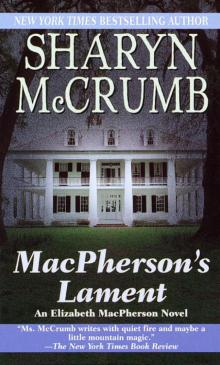 Elizabeth MacPherson 07 - MacPherson’s Lament
Elizabeth MacPherson 07 - MacPherson’s Lament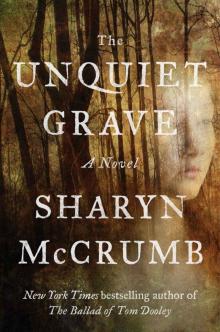 The Unquiet Grave: A Novel
The Unquiet Grave: A Novel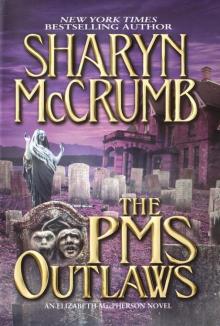 The PMS Outlaws: An Elizabeth MacPherson Novel
The PMS Outlaws: An Elizabeth MacPherson Novel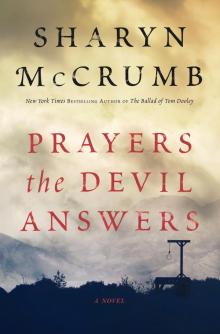 Prayers the Devil Answers
Prayers the Devil Answers Paying the Piper
Paying the Piper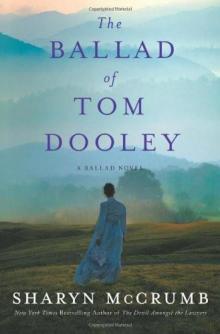 The Ballad of Tom Dooley: A Ballad Novel
The Ballad of Tom Dooley: A Ballad Novel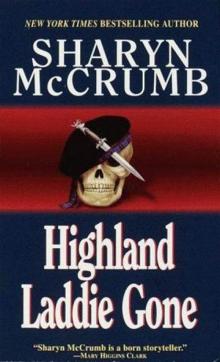 Highland Laddie Gone
Highland Laddie Gone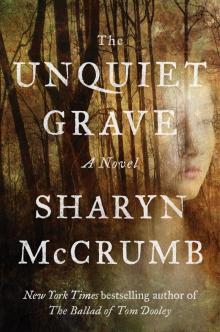 The Unquiet Grave
The Unquiet Grave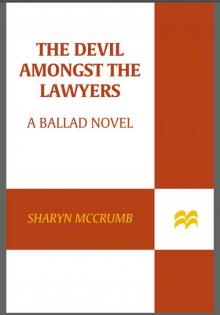 The Devil Amongst the Lawyers
The Devil Amongst the Lawyers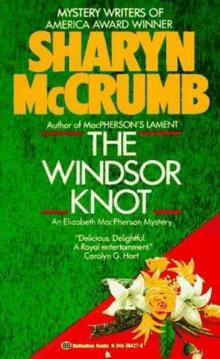 The Windsor Knot
The Windsor Knot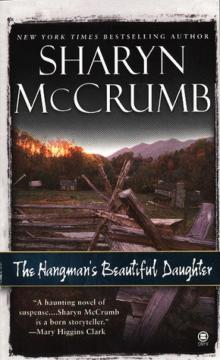 The Hangman's Beautiful Daughter
The Hangman's Beautiful Daughter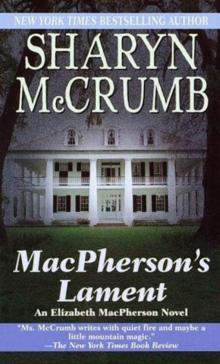 MacPherson's Lament
MacPherson's Lament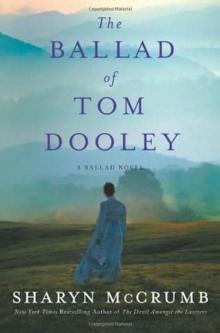 The Ballad of Tom Dooley
The Ballad of Tom Dooley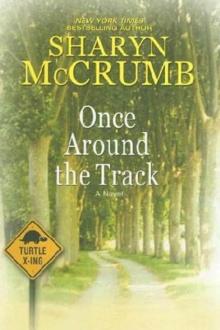 Once Around the Track
Once Around the Track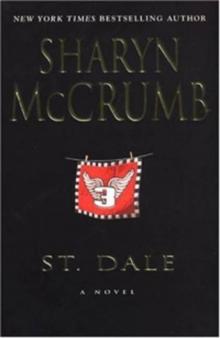 St. Dale
St. Dale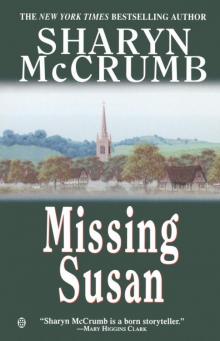 Elizabeth MacPherson 06 - Missing Susan
Elizabeth MacPherson 06 - Missing Susan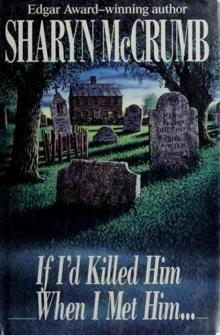 If I'd Killed Him When I Met Him…
If I'd Killed Him When I Met Him…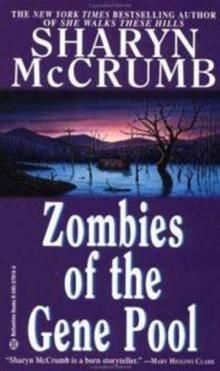 Zombies of the Gene Pool
Zombies of the Gene Pool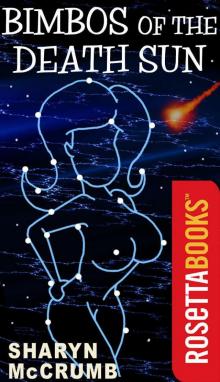 Bimbos of the Death Sun
Bimbos of the Death Sun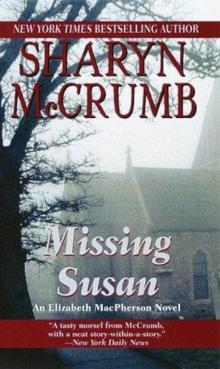 Missing Susan
Missing Susan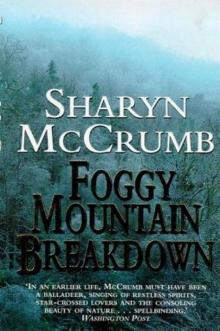 Foggy Mountain Breakdown and Other Stories
Foggy Mountain Breakdown and Other Stories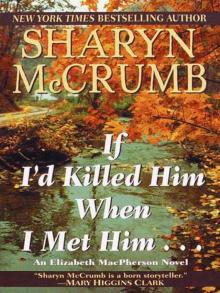 If I'd Killed Him When I Met Him
If I'd Killed Him When I Met Him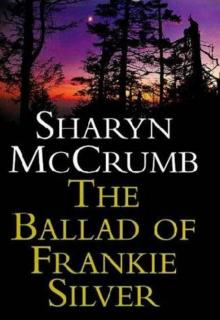 The Ballad of Frankie Silver
The Ballad of Frankie Silver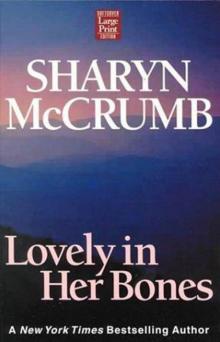 Lovely In Her Bones
Lovely In Her Bones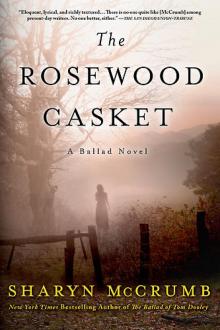 The Rosewood Casket
The Rosewood Casket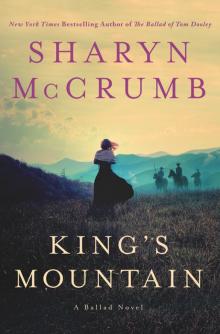 King's Mountain
King's Mountain